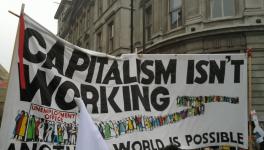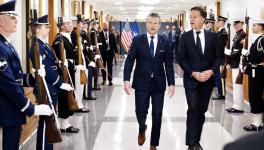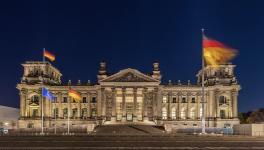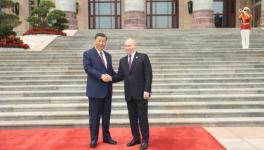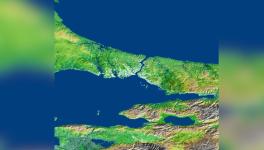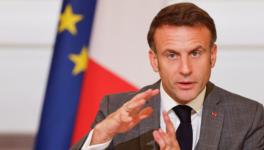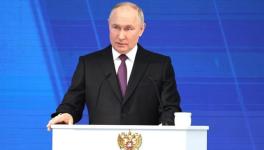Political Uncertainty Continues in Libya a Year After Elections Were Postponed
Photo: UNOCHA/Giles Clarke
It has been a year since elections were to take place in Libya under the UN peace initiative, formally known as the Libyan Political Dialogue Forum (LPDF), on December 24, 2021. It is now clear that elections will not take place this year either. The delay in the elections and the existence of two rival governments in the country has increased fears that Libya will either relapse into full-scale civil war or split into two.
Newly-appointed special representative of the UN secretary general for Libya and head of the UN Support Mission in the country (UNSMIL), Abdoulaye Bathily, during a presentation to the UN Security Council in November had noted that “there is an increasing recognition that some institutional players are actively hindering progress towards elections.”
Bathily reported on December 16 that the protracted crisis in the country carries the “serious risk” of further division with “signs of partition with two parallel governments, separate security apparatuses, and a divided central bank” already visible.
Need for intra-Libyan dialogue
Though the UN-led initiative for peace in Libya has failed to unite the country and resolve the differences over the constitutional provisions of power sharing, Bathily claims that this lacuna has been identified and re-emphasizes the significance of further intra-Libyan dialogue to resolve outstanding issues.
The LPDF had appointed a three-member presidential council and an interim government headed by Prime Minister Abdel Hamied Dbeibah with a clear mandate: to hold elections on December 24, 2021. These were postponed at the last movement because of disagreements over the electoral law and Dbeibah’s own candidacy. Since then, the institutional arrangements made under the LPDF have largely crumbled.
Questioning the legitimacy of the Dbeibah-led interim government, the Tobruk-based House of Representative (HOR) appointed a new government led by Prime Minister Fathi Bashagha in February 2022. After Dbeibah refused to hand over power to Bashagha, clashes took place between forces loyal to each in Tripoli in July and August, during which approximately 50 people were killed. Bashagha has finally made Sirte the base of his government.
The 5+5 Joint Military Commission (JMC), despite its mandate to unite the military, has failed to do so, and its members have taken open sides across the political divide. This has led to the disruption of oil production and exports from the country.
The three-member presidential council has, however, provided some stability and has helped in maintaining the ceasefire first agreed to in October 2020, although this has failed to resolve the dispute between the two rival administrations.
Small progress made but challenges remain
The appointment of Bathily, who hails from Senegal, in October this year has broken the deadlock that emerged after the role of his predecessor Stephanie Williams, who orchestrated the peace talks in 2020, became contentious due to several countries, such as Russia, objecting to her continuation. While Bathily has made some small progress in the last year, he acknowledges that the main challenges to peace remain.
One of the achievements has been the formation of a sub-committee for disarmament, demobilization and reintegration of the armed groups in the country during a meeting of the 5+5 JMC. Bathily also pointed out that due a year of relative peace, the number of internally displaced people has gone down significantly. The total number of internally displaced people in Libya now is 134,787, as opposed to over 316,000 in October 2020.
The Libyan oil sector was shut for a long time due to the war, depriving the country of crucial revenues. Resumption of oil production last year was a major achievement of the UN-led peace initiative. However, there were disagreements over the appointment of the new head of the National Oil Corporation (NOC) by Dbeibah in July. These differences seem to have settled for now as the NOC lifted its force majeure earlier this month and invited foreign investments.
The UN has also facilitated several rounds of talks between representatives of the both the governments in Cairo, Egypt, following the first round of clashes and to resolve the issues over the electoral law and the constitution. Bathily said that the latest round of meetings between Aguila Saleh, speaker of the Tobruk-based parliament, and Khaled al-Meshri, head of the High State Council, had been scheduled on December 4 in Zintan in the western Libya, however, it was canceled due to logistical reasons. He expressed hope that it will be held soon.
Bathily also noted the issues hampering the peace process in Libya, such as the serious disagreements over the draft constitution first proposed in 2017. He expressed concern that Tobruk-based HOR is losing faith in the dialogue and has recently decided to create a separate constitution court in Benghazi. He also noted that economic concerns remain a major challenge as various regions in the country have started expressing dissatisfaction over “unequal allocation” of oil and gas revenues.
For Bathily, apart from the above mentioned differences, “individuals and entities acting and supporting acts” which harm the prospects of early elections, as well as the presence of foreign troops, remain among the biggest challenges to peace in Libya.
Get the latest reports & analysis with people's perspective on Protests, movements & deep analytical videos, discussions of the current affairs in your Telegram app. Subscribe to NewsClick's Telegram channel & get Real-Time updates on stories, as they get published on our website.










